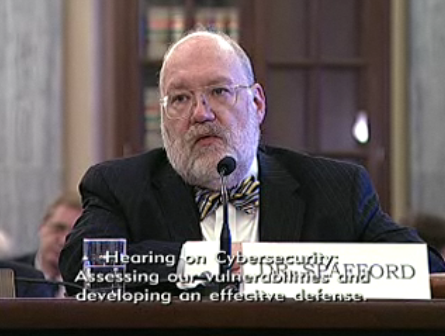Posts tagged intellectual+property
Page Content
This time, the Senate
On March 19, I had an opportunity to testify before the Senate Committee on on Commerce, Science, and Transportation. The hearing was entitled Cybersecurity -- Assessing Our Vulnerabilities and Developing An Effective Defense.
I was asked to include information on research problems, educational initiatives, and issues regarding the current state of cyber security in the nation. As is usual for such things, the time between the invitation and the due date for written testimony was short. Thus, I didn't have the time to delve deeply into the topic areas, but could only address the things that I already had on hand -- including some posts from this blog that I had written before. The result was a little longer than the other statements, but I think I covered more ground.
One hint for people testifying before Congress on such things: you can't depend on how long you will have for spoken remarks, so be sure any points you want to make are in your written testimony. In this case, the hearing was limited to about 75 minutes because there were several votes scheduled on the Senate floor, and the committee needed to adjourn to allow the Senators to attend the votes. And, as is common for too many hearings, there weren't many of the committee members present; I believe the hearing began with only two of the 25 members present, and some movement of members in and out to reach a maximum of four seated at any one time. In this case, the chair (Senator Jay Rockefeller of West Virginia) apologized to us several times for the low turnout. However, many (all?) of the staff and aides were present, so I'm certain the gist of the testimony presented will be considered.
The Senator made a nice introductory statement.
My written testimony is available on my website as well as the committee site. My oral statement was from rough notes that I modified on the fly as I listened to the other testimony (by Jim Lewis, Eric Weiss and Ed Amoroso). That statement, and the whole hearing, are available via the archived hearing webcast (my remarks start at about 46:30 into the webcast). If I get a transcribed version of those remarks, I will post them along with my written testimony on my website in the "US government" section.
Comments by the other speakers were good overall and I think we collectively covered a lot of ground. The questions from the Senators present indicated that they were listening and knew some of the problems in the area. The comments from Senator Nelson about the intrusions into his systems were surprising: several Senate security staff were present at the hearing and indicated to me that his remarks were the first they had heard of the incidents! So, the hearing apparently set off an incident-response exercise -- separate from responding to my presence in the building, that is. ![]()
Will this hearing make a difference? I don't know. I've been testifying and saying the same things for over a dozen years (this was my 8th Congressional hearing testimony) and things haven't gotten that much better...and may even be worse. Senator Rockefeller has indicated he intends to introduce legislation supporting more funding for students studying cyber security issues. There was some good news coverage of all this (e.g., FCW and CNet).
I am told that there will be more hearings by this committee. Some House committees have been holding hearings too, and the President's 60 day review continues apace. The added attention is great, but with the sudden interest by so many, the result may be more confusion rather than resolution.
Stay tuned.
As a reminder, if you want to know about my occasional postings such as this but don't want to subscribe to the RSS feed, you can subscribe to the mailing list.
Also as a reminder, there is my tumble blog on security issues, with links to items on the news and WWW of possible interest to those who find my ramblings and rants of interest.
Unsecured Economies, and Overly-secured Reports
The Report
Over the last few months, CERIAS faculty members Jackie Rees and Karthik Kannan have been busy analyzing data collected from IT executives around the world, and have been interviewing a variety of experts in cybercrime and corporate strategy. The results of their labors were published yesterday by the McAfee Corporation (a CERIAS Tier II partner) as the report Unsecured Economies: Protecting Vital Information.
The conclusions of the report are somewhat pessimistic about prospects for cyber security in the coming few years. The combination of economic pressures, weak efforts at law enforcement, international differences in perceptions of privacy and security, and the continuing challenges of providing secured computing are combining to place vast amounts of valuable intellectual property (IP) at risk. The report presents estimates that IP worth billions of dollars (US) was stolen or damaged last year, and we can only expect the losses to increase.
Additionally, the report details five general conclusions derived from the data:
- The recession will put intellectual property at risk
- There is considerable international variation in the commitment (management and resources) to protect cyber
- Intellectual property is now an "international currency" that is as much a target as actual currency
- Employees steal intellectual property for financial gain and competitive advantage
- Geopolitical aspects present differing risk profiles for information stored "offshore" from "home" countries.
None of these should be a big surprise to anyone who has been watching the field or listening to those of us who are working in it. What is interesting about the report is the presented magnitude and distribution of the issues. This is the first truely global study of these issues, and thus provides an important step forward in understanding the scope of these issues.
I will repeat here some of what I wrote for the conclusion of the report; I have been saying these same things for many years, and the report simply underscores the importance of this advice:
“Information security has transformed from simply ’preventing bad things from happening ’into a fundamental business component.' C-level executives must recognize this change. This includes viewing cybersecurity as a critical business enabler rather than as a simple cost center that can be trimmed without obvious impact on the corporate bottom line; not all of the impact will be immediately and directly noticeable. In some cases, the only impact of degraded cybersecurity will be going from ‘Doing okay’ to ‘Completely ruined’ with no warning before the change.
Cybersecurity fills multiple roles in a company, and all are important for organizational health.
- First, cybersecurity provides positive control over resources that provide the company a competitive advantage: intellectual property, customer information, trends and projections,financial and personnel records and so on. Poor security puts these resources at risk.
- Second, good security provides executives with confidence that the data they are seeing is accurate and true, thus leading to sound decisions and appropriate compliance with regulation and policy
- Third, strong cybersecurity supports businesses taking new risks and entering new markets with confidence in their ability to respond appropriately to change
- And fourth, good cybersecurity is necessary to build and maintain a reputation for reliability and sound behavior, which in turn are necessary to attract and retain customers and partners.
This study clearly shows that some customers are unwilling to do business with entities they consider poorly secured. Given massive market failures, significant fraud and increasing threats of government oversight and regulation, companies with strong controls, transparent recordkeeping, agile infrastructures and sterling reputations are clearly at an advantage -- and strong cybersecurity is a fundamental component of all four. Executives who understand this will be able to employ cybersecurity as an organic element of company (and government) survival -- and growth.“
We are grateful to McAfee, Inc. for their support and assistance in putting this report together.
Getting the Report
Update: You can now download the report sans-registration from CERIAS.
 The report is available at no charge and the PDF can be downloaded (click on the image of the report cover to the left, or here). Note that to download the report requires registration.
The report is available at no charge and the PDF can be downloaded (click on the image of the report cover to the left, or here). Note that to download the report requires registration.
Some of you may be opposed to providing your contact information to obtain the report, especially as that information may be used in marketing. Personally, I believe that the registration should be optional. However, the McAfee corporation paid for the report, and they control the distribution.
As such, those of us at CERIAS will honor their decision.
However, I will observe that many other people object to these kinds of registration requirements (the NY Times is another notable example of a registration-required site). As a result, they have developed WWW applications, such as BugMeNot, which are freely available for others to use to bypass these requirements. Others respond to these requests by identifying company personnel from information on corporate sites and then using that information to register -- both to avoid giving out their own information and to add some noise to the data being collected.
None of us here at CERIAS are suggesting that you use one of the above-described methods. We do, however, encourage you to get the report, and to do so in an appropriate manner. We hope you will find it informative.

